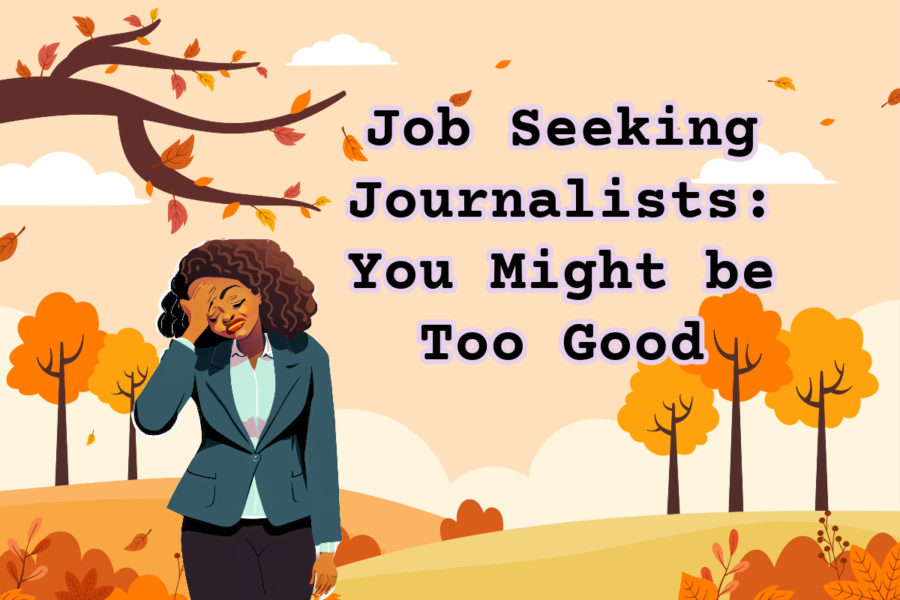LinkedIn Premium has this potentially cool feature that shows you jobs where you’re a top applicant. Supposedly. I apply to those jobs and get nothing. Sometimes a form rejection email. Other times I’m asked to take an edit test and then I get a form rejection email. Most times, I get nothing. This is the case for all the job seeking journalists I know.
I was thinking it was me, but friends in HR and even headhunters I work with have told me that many recruiters actually want candidates with less experience. They can pay them less and work them more, with little chance of pushback. That’s if they are truly hiring anyway. The same friends taught me that companies have to post job openings — even if they know they are going to promote in-house — and that they will keep the ads up even once the positions are filled so that they get the most out of their paid job postings.
My fellow job seeking journalists and I are often given the same excuses, even after being recruited. One of the main excuses is that the media outlets chose other candidates with “a little more experience.” Baby, how? Especially when you recruited me! When I’ve written for your publication multiple times!
Potential Hope for This Job Seeking Journalist?
I had an interview a few days back that I am incredibly excited about! The role is in my field and everything. The interviewer, the editor-in-chief of this glorious print glossy, was looking at my resume (we were on Zoom) and I could tell by her body language that she was impressed by my work. When I asked about compensation, she said that she had to let me know that the pay is significantly less than what I should get for all my years of experience and awesome bylines. And, it is. It’s about the same as what I got paid in 2012, in my first full-time paid reporter job. However, I really want this job.
I mentioned to her that during this super long job search, I started to gaslight myself into believing that maybe I wasn’t good enough. That I’d messed up in all these edit tests.* That all these enviable bylines were just one-offs. That I really had no unique talent.
I’m thankful for the friends in HR who told me it’s that I’m actually overqualified and that no one wants to pay me what I deserve. I’m thankful for my fellow colleagues in journalism and other job seeking journalists who told me it’s that they want to hire people who don’t know what it’s supposed to look like and won’t push back. (Mean Girls teacher voice) “I’m a pusher.”
*Wanna know how I feel about edit tests? They are the most ridiculous concept for experienced journalists, and I’m leaning toward never taking another. One, they are unpaid work. I’ve heard of people getting paid for them, but I certainly haven’t been paid myself. Two, people will steal your content. Eater NOLA — who came to me, for the record — took one of my ideas from a very long edit test. Then they hired some girl no one in New Orleans food journalism even knew. Thankfully, that pushed me to write about gumbo and grilled cheese for Very Local New Orleans. Because I know Eater NOLA would’ve ruined it (the same way they ruin everything else) had they stolen my idea. New Orleans food journalism is mostly rich white dude transplants’ phoned-in rewritten press releases and it’s embarrassing. That’s why I write for Bon Appetit and Epicurious (flips hair).
Once, I was Part of the Problem
When I was a baby journalist, when The Times-Picayune came to poach me from Gambit Weekly after having less than a year of experience, I remember hearing “grown up” journalists talk about how the paper was hiring so many youngsters because they could pay them less and work them harder. The rest of the daycare crew came up in a time when you would do it all yourself. Writing, editing, photography, video, social media, SEO. I guess NOLA.com | The Times-Picayune figured, why keep all these people on staff if we can just hire “one-man bands.”
It was a horrible feeling, being part of the problem. My favorite people were let go, people I admired and always will. (I accidentally made it hilariously uncomfortable during my final interview when Lynn Cunningham, Mark Lorando and Jim Amoss asked who my favorite reporters were at the paper, and I only mentioned ones who’d been released.) But, I had to put myself first and I knew that since [redacted], there was no room for growth for me at Gambit.
After being moved around a lot, though, from beat to beat, editor to editor, shift to shift, building to building — while the overall mood of the newsroom was understandably sad and tense — I packed my little backpack (it was a “Google-Nike sort of vibe” at One Canal Place, so we had no permanent desks) and went on my way only five months later. (To be clear, I’m fully rehireable and I know for a fact a lot of people would welcome me back joyfully.)

Decade Delayed Deja Vu
Here I am today, a decade later, plagued by the same issues that affected my predecessors then. A few of us are still in journalism, mostly ones who are still at the same outlets or some who left a bit before whatever this stuff we have going on today came into being. (“I get my news from TikTok and Instagram” looking folks.)
The rest, a bunch of overwhelmingly talented journalists, are in communications. I tried getting into communications, because it’s one of four natural progressions for journalists (the others are authorship, education, law, and politics, but I’d birth a porcupine naturally before ever getting into politics here).
Excitingly, I made it to the interview process for the two communications jobs to which I applied! Unfortunately, I didn’t make it past that because “tell me about a time when you…” don’t work when you ain’t never did it and don’t like lying.
God-willing, I’ll be able to report back soon with some good news about that beautiful job (an associate editor position for a magazine that believes in authentic, ethical journalism) and I’ll finally leave the land of job seeking journalists.









Top Posts